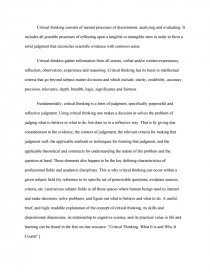Critical Thinking
Essay by review • December 27, 2010 • Essay • 286 Words (2 Pages) • 863 Views
Critical thinking consists of mental processes of discernment, analyzing and evaluating. It includes all possible processes of reflecting upon a tangible or intangible item in order to form a solid judgment that reconciles scientific evidence with common sense.
Critical thinkers gather information from all senses, verbal and/or written expressions, reflection, observation, experience and reasoning. Critical thinking has its basis in intellectual criteria that go beyond subject-matter divisions and which include: clarity, credibility, accuracy, precision, relevance, depth, breadth, logic, significance and fairness.
Fundamentally, critical thinking is a form of judgment, specifically purposeful and reflective judgment. Using critical thinking one makes a decision or solves the problem of judging what to believe or what to do, but does so in a reflective way. That is by giving due consideration to the evidence, the context of judgement, the relevant criteria for making that judgment well, the applicable methods or techniques for forming that judgment, and the applicable theoretical and constructs for understanding the nature of the problem and the question at hand. These elements also happen to be the key defining characteristics of professional fields and academic disciplines. This is why critical thinking can occur within a given subject field (by reference to its specific set of permissible questions, evidence sources, criteria, etc.) and across subject fields in all those spaces where human beings need to interact and make decisions, solve problems, and figure out what to believe and what to do. A useful, brief, and higly readable explanation of the concept of critical thinking, its skills and dispositional dimensions, its relationship to cognitive science, and its practical value in life and learning can be found in the free on-line resource: "Critical Thinking: What It is and Why It Counts" [
...
...
